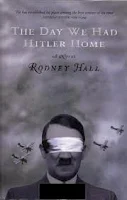A lot of the comments you left in response to my review of A Body in the Library yesterday were in relation which Agatha Christie detective was your favourite - so today's post as part of the Agatha Christie Week here at Page Turners asks you this -
which Agatha Christie detective is your favourite?
Tommy and Tuppence
My first encounter with Tommy and Tuppence was in The Secret Adversary, purportedly a political thriller type mystery, which in fact was their first introduction to the world. Following a chance meeting between Tommy and Tuppence in a restaurant after Tommy is released after completing his WWI service, they form the "Young Adventurers Ltd" and set out to solve mysteries on behalf of their clients.
Neither Tommy or Tuppence are described as being particularly attractive, but they are absolutely lovely people. They are enthusiastic about life and their lives and set out with the best of intentions to help others, in their own individual way.
Tommy and Tuppence appeared in subsequent books together after falling in love and deciding to live their lives together. When you read a Tommy and Tuppence book not only do you get some interesting puzzles to solve, but you get to see lovable characters grow old together.
Ariadne Oliver
Cards on the Table is one of my favourite Agatha Christie novels and it was my first introduction to Ariadne Oliver. Like Agatha Christie herself, Ariadne Oliver is an author of detective fiction who becomes embroiled in real life murders, usually as Hercule Poirot's assistance but also as a friend of Parker Pyne. In The Pale Horse and a collection of short stories, Ariadne is also a detective in her own right.
I love Ariadne Oliver. She is big, bustling, outgoing, messy and above all an outrageous feminist who champions women's rights and believes the world would be a better place if women were in charge - a woman after my own heart!
Hercule Poirot
My all-time favourite - a very particular Belgian with an egg-shaped head who exercises his little grey cells to solve his mysteries. Christie's most popular detective, he was introduced to the world in The Mysterious Affair at Styles, her very first novel and another one of my favourites.
Poirot is perhaps the most distinctive of her characters. He is a perfectionist, an egotist and an eccentric. He is my favourite because I find his mysteries some of the more interesting. There is excitement, action and always an unexpected ending.
Hastings
Where would Hercule Poirot be without his trusted Hastings. Like Poirot, his first appearance was in Agatha Christie's first novel A Mysterious Affair at Styles, and he appeared in many of Poirot's subsequent cases, largely chronicling Poirot's adventures but also playing an important role in discovering some of the murderers.
Miss Marple
Miss Marple is another one of Agatha Christie's most famous detectives, and another of my favourites. She is a beautiful old lady with a kind, if not very trusting, nature. My review of A Body in the Library yesterday was a very enjoyable Miss Marple mystery.
Miss Marple solves her mysteries by drawing comparisons between the mystery before and happenings in her local village. Her theories of human nature are so universally accurate that her methods of analogy never fail to give her conclusions. I remember reading The Tuesday Night Clubas a child and being enamoured with Miss Marple, no matter what little mysteries were thrown her way she was able to solve them all.
Harley Quin and Mr Satterthwaite
Harley Quin is perhaps not one of the most well-known of Christie's detectives and he largely appears in short stories that star him as the sole detective. Agatha Christie spoke of Harley Quin as her favourite character, and he is described at agathachristie.com as follows: "Harley Quin is a mystery. He appears and disappears unexpectedly and by strange tricks of lights and reflections; making his clothes seem brightly multicoloured like the theatrical harlequin."
My only experience with Harley Quin is in Three Act Tragedy, a great book with a surprising ending. However, for me, it was Mr Satterthwaite that stood out for me in this story, another of Agatha Christie's detectives. Mr Satterthwaite is a character who works alongside Harley Quin. He is a passionate old man who provides a nice contrast to Harley Quin's mystery.
Parker Pyne
Parker Pyne is the only Agatha Christie detective that I have no recollection of. I know that I have read Parker Pyne Investigates as a child, but I have no memory of its contents. He is not in many of Christie's novels, but he does appear alongside Hercule Poirot and Ariadne Oliver.
So - who is your favourite Agatha Christie detective and why?
* The above information comes from my both my own knowledge and information gathered from agathachristie.com. Images from agathachristie.com
Originally posted 1 February 2011 Page Turners







.webp)




.jfif)


.webp)














.jfif)
















